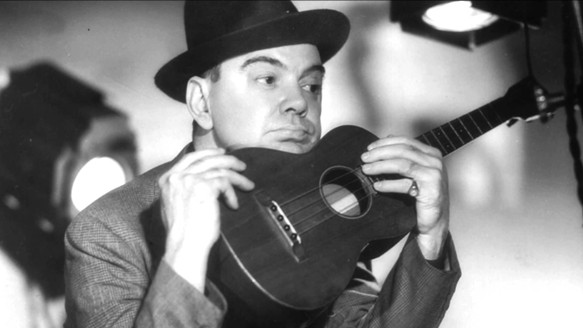
To listen to today’s reflection as a podcast, click here
Like a lot of people, Cliff Edwards wanted to hit the big time.
Unlike most people, he actually succeeded.
In 1909, Edwards dropped out of school in Hannibal, Missouri – he was 14 years old at the time – and became a traveling entertainer. He sang in saloons and flophouses across the Midwest, accompanying himself on the ukulele.
Cliff taught himself to play that humble “mini-guitar” because it was the cheapest instrument in the music store. One club owner, who could never remember his name, called him “Ukulele Ike.” The nickname stuck.
During the 20s and early 30s, Ike became a star on Broadway, in Vaudeville, and in early Hollywood movies.
His crystal clear voice could slide up and down over three octaves. In 1929 – the year America and the world were plunged into the Great Depression – he recorded Singin’ in the Rain, which hit number one on the charts.
Edwards further endeared himself to fans by voicing some of the earliest Disney animated characters.
Success brought many things to Ukulele Ike. The one thing it didn’t deliver was happiness.
He married and divorced three times. He made a fortune and lost it all, declaring bankruptcy on four occasions.
Edwards battled drug addiction and alcoholism. He died penniless in 1971 as a charity patient at a Hollywood hospital. Since his body was unclaimed, it was donated to the UCLA Medical School.
But the Actors’ Fund of America, hearing that news, compassionately purchased his remains and paid for the burial. Disney funded his gravestone.
Most people would say they have never heard of Ukulele Ike.
But it would be hard to find anyone in America who hasn’t been touched by the one-of-a-kind vocals of his signature song: When You Wish Upon a Star.
Cliff Edwards was the voice of Jiminy Cricket in Walt Disney’s 1940 masterpiece Pinocchio. He sang the lilting tune that after more than 75 years is still the most recognizable “sound of Disney:”
When you wish upon a star
Makes no difference who you are
Anything your heart desires will come to you
Edwards’ own life was a testimony to the fact that wishing for “anything your heart desires” (and sometimes even getting it) is one of the world’s worst guides to happiness.
It’s one of the stranger aspects of human existence that if we aim for happiness, we rarely experience it.
Happiness is almost always a by-product of aiming for something else.
If we choose to serve others; generously share what God has shared with us; use our gifts and talents in ways that bless others, prompting us to lose track of our own fears and worries – then we don’t generally have to go looking for happiness.
Happiness will usually find us.
The overall message of Scripture is that if we set our hearts on what Jesus identified as our two primary commandments – loving God and loving others – we will come to know the grace and peace that God alone can provide. David writes, “You make known to me the path of life; in your presence there is fullness of joy; at your right hand are pleasures forevermore” (Psalm 16:11).
The happiest people in the world are those who yearn to bring happiness to others.
And it makes no difference who you are.
